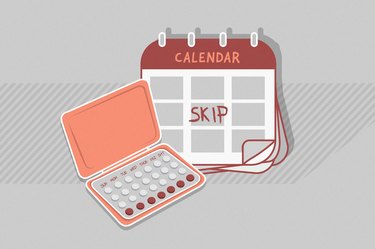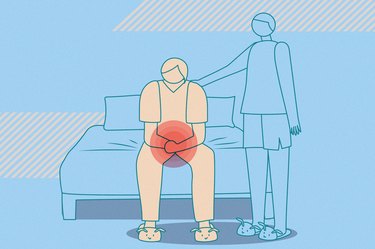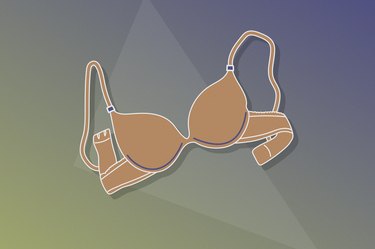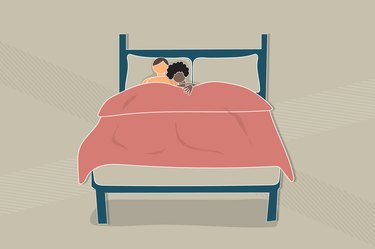
Periods can be mildly inconvenient or annoying, and in some cases even downright debilitating. So if you want to delay or skip your period using birth control pills, is that OK?
The answer, usually, is yes. "When someone is on birth control, there is no medical reason to have a period, so many individuals may choose to skip cycles," says Adi Katz, MD, director of gynecology at Lenox Hill Hospital in New York.
Video of the Day
Video of the Day
If you're wondering how the whole thing works and whether taking the pill to bypass your period is right for you, read on. Here's everything you need to know.
Why You Might Want to Skip Your Period
Sometimes your period is set to happen at a time when you'd rather not have it. For example, maybe you're going on vacation and don't want your period while you're traveling or wearing a bathing suit.
In other cases, a person's cycle might cause side effects that could be uncomfortable or even have a negative effect on their health. "Painful periods, heavy cycles, mood changes related to menses, endometriosis or anemia are all common reasons," Dr. Katz says.
Skipping can also be beneficial if a person has a physical or mental condition that makes it difficult to manage their period.
The Benefits of Skipping Your Period
Again, there's no medical reason to have a period while you're on birth control. And skipping out can actually be an easy solution for many of the problems we just talked about.
According to Kelli Burroughs, MD, department chairman of obstetrics and gynecology at Memorial Hermann Sugar Land Hospital in Texas, using birth control to forego your periods can:
- Make your schedule more convenient, so you don't get your period on vacation or during another planned event
- Manage heavy or irregular bleeding and the problems that can come with it, such as anemia
- Reduce physical symptoms like cramping or headaches
- Ease mood-related symptoms like depression, anger, irritability or anxiety
- Help manage chronic pelvic pain, including pain from endometriosis
- Help manage heavy bleeding or pain from fibroids
- Reduce the risk of certain cancers, including ovarian, endometrial and colon cancers
The Risks of Skipping Your Period
There aren't too many negative side effects of using birth control to skip your period, say Dr. Katz and Dr. Burroughs. Foregoing a period (or even many, many periods!) won't harm your body in any way, and it won't make your birth control any less effective, per Planned Parenthood. Taking birth control continuously (aka skipping the placebo pills) also won't increase the (tiny) risks that come with birth control pill use, such as blood clots, heart attack or stroke, Dr. Burroughs notes.
And there's no evidence that skipping your period on the pill affects fertility. But keep this one thing in mind: Not getting a period can make it harder to tell if you accidentally become pregnant.
"There are some individuals who prefer to see a monthly menses to confirm the absence of pregnancy, and therefore continuous use of oral contraceptive pills might create anxiety," Dr. Burroughs says.
It's also possible to experience some breakthrough bleeding or spotting, especially if you skip many periods in a row.
"It can be due to the pill and the extra hormones causing the endometrium, or uterine lining, to be less stable in structure and break off," Dr. Katz says.
While spotting in between skipped periods isn't harmful, it can be annoying. "If you start experiencing spotting while on the pill, take a short break. I usually tell my patients to take the inactive pills every three or four packs to avoid breakthrough bleeding," she says.
How to Use Birth Control to Skip Your Period
Before getting started, let's quickly review how birth control pills work. Most pill packs have three weeks' worth of active pills containing hormones that keep you from being fertile, and in turn, help prevent pregnancy, according to the Mayo Clinic. The last week of pills are placebos that don't have any hormones. (You just take them to stay in the habit of popping your pill every day.) Without the hormones from the pills, your body experiences withdrawal bleeding, aka your period.
Skipping the placebo pills in your pack and moving directly to the active pills in the next pack allows you to sidestep that week of withdrawal bleeding, so you don't experience a period. "The general principle is to avoid taking the placebo pills at the end of the packet and immediately start the next packet," Dr. Burroughs says. Pretty simple, right?
You can do the same thing if you use another form of monthly hormonal birth control, like the vaginal ring or patch. "After removing the ring or patch, a new ring or patch would immediately be inserted or applied to the skin," Dr. Burroughs says.
Finally? Even though purposely skipping your period on birth control is pretty common practice, it's always a good idea to check in with your gynecologist. "Each case is individual, and it's best to discuss with a health care provider," Dr. Katz says.
If you want to skip your period because your cycles are super heavy, for instance, your doc might also want to do an exam to figure out the underlying cause.
So, How Bad Is It Really to Skip Your Period Using Birth Control?
It's not bad to take birth control to stop your period. In fact, doing so can make it easier to manage symptoms or problems related to your period, including annoying PMS and painful endometriosis.
Just keep a few important things in mind: First, it might be harder to tell if you're pregnant when you're already not getting a period, so be sure to use your birth control pills consistently for the most effective protection. Also, the longer you go without a monthly bleeding session, the more likely you might be to experience some breakthrough spotting.
Is this an emergency? If you are experiencing serious medical symptoms, please see the National Library of Medicine’s list of signs you need emergency medical attention or call 911.



